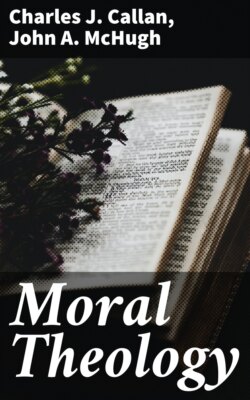Читать книгу Moral Theology - Charles J. Callan - Страница 3
На сайте Литреса книга снята с продажи.
PREFACE
ОглавлениеTable of Contents
The purpose of the present work is to give a complete and comprehensive treatise on Catholic Moral Theology, that is, on that branch of sacred learning which treats of the regulation of human conduct in the light of reason and revealed truth. This new work strives to deal with the subject as a systematic and orderly whole, and is based throughout on the principles, teaching and method of St. Thomas Aquinas, while supplementing that great Doctor of the Church from the best modern authorities. Needless to say, there are many questions and problems connected with modern life that did not exist when the great classic works on Moral Theology were written, and to these naturally special attention has been given in the treatment that follows.
Nowadays, since the appearance of the New Code and of many special works on Canon Law, it would be a mistake to encumber the pages of a work like the present one with canonical questions of interest only to the specialist, and which are ably and abundantly treated in fine commentaries on the Code that are already available. Likewise, it would be an error to treat here matter pertinent only to Dogmatic Theology or History. All digressions, therefore, into alien fields have been avoided in this work, with the result that a greater number of useful moral questions have been herein considered.
But not only is it necessary to avoid irrelevant subjects, but it is also needful not to sacrifice essentials for accidentals in any work of this kind. It is the fault of too many textbooks on Moral Theology to stress controversies, cite authors, and quote opinions, at the expense of the principles and reasons that govern and explain the teaching given. This work eschews that method, and is at pains everywhere, first of all, to lay the foundations on which the superstructure is to be built, namely, the definitions and rules that are presupposed to moral judgments and conclusions. Obviously, this is a more logical way of proceeding, and it consequently enables the student much more easily to understand and retain the matter studied, since he can thus reason questions out for himself. Moreover, such a method makes for brevity and renders it possible, as said above, to treat more subjects than could otherwise be treated; it makes it possible to condense the matter of many pages of larger and less accessible works into brief and terse paragraphs. But from this it should not be gathered that the work which follows aims to present Moral Theology in a dryly scientific fashion. On the contrary, it has been our endeavor to treat the matter in a way that is at once clear, solid, comprehensive and interesting. Since the general and the abstract do not make the same strong impression as the particular and the concrete, laws and axioms are copiously illustrated throughout with pertinent and practical examples that often amount to brief casus conscientiæ, thus combining the theory and the practice of Moral Theology.
It would be a mistake to think that, while Moral Theology is a technical and scientific treatise on human conduct, it deals exclusively or primarily with vice and sin, and that it is intended only to enable the priest rightly to administer the Sacrament of Penance, distinguishing between the various classes of sins and their consequences. Of course, it does all this, but it should do much more; for it has also a much higher purpose, which is to enable man, not only to know what is forbidden and how he may escape from moral disease and death, but also to understand what are his duties and how he may live the life of grace and virtue. The subject is indeed more positive than negative, and it should be discussed accordingly. Thus, far from being useful merely to confessors as a guide by which they may detect and distinguish mortal and venial sins and the higher and lower degrees of culpability, Moral Theology in its broader aspect should be of the greatest service likewise to the individual in forming his own habits and character, and in particular to those who have the guidance of others, whether in or out of the confessional, such as pastors, preachers, teachers, and the like. Consequently, the present work has been written with a view to the homiletic and pastoral functions of the priest, as well as those that pertain strictly to the administration of the Sacraments.
Heretofore works on Moral Theology in English have been altogether too few or too fragmentary, whereas they have been abundant in the vernaculars of Continental Europe—German, French, Spanish, Italian, etc. This does not mean that the present work is intended to replace the Latin text-books used in our seminaries, but rather that it should enable students and priests to get a more thorough and ready knowledge of an all-important subject, and to adapt it more easily to the varying needs of the ministry.
The section of this work on Law has been carefully read by two eminent civil lawyers.
THE AUTHORS. May 10, 1929.
